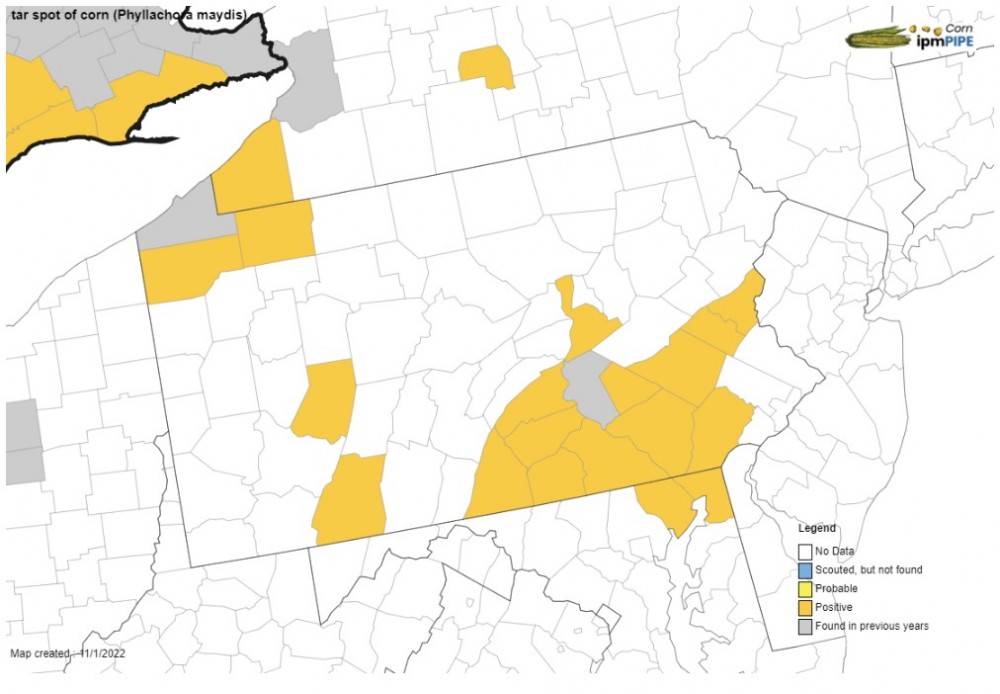Reflecting on Tar Spot in 2022
Excerpt from P. Esker and A. Collins: Penn State ExtensionThe tar spot situation in Pennsylvania
While tar spot was first found in Pennsylvania in late 2020, its spread was limited in the commonwealth until recently. This year (2022), tar spot was found across the majority of southern PA and in western PA into the Lake Erie region. This tar spot map (Figure 1.) shows counties with officially confirmed reports, but given the current distribution, there is a high likelihood of tar spot presence in unreported areas. We want to emphasize that there were no reports of yield loss due to tar spot in the areas affected.
How the pathogen survives and spreadsThe fungus that causes tar spot can survive our PA winters in corn residue on fields, in stover, and uncomposted bedding. We also hypothesize that the fungus can live and overwinter in certain grassy weeds. When the weather becomes favorable to the fungus in the summer, spores will be produced from these reservoirs and blow on the wind or splash onto fresh corn plants.
What we should do about tar spotKnowing tar spot has been detected in your county is not a reason to plan to spray next season. While we are still learning about the conditions that favor development, you can think about this as you do for diseases such as gray leaf spot and northern corn leaf blight. We typically see these diseases every year, but we often do not benefit economically from a spray for them. Instead, knowing tar spot has been found near you means you should now be scouting for symptoms earlier in the season (say, by July 4th) so that you can track arrival and progress to inform your fungicide decisions better. Suppose tar spot is detected early in a field (like during vegetative or early reproductive growth stages), and disease-favorable weather conditions are predicted for the next few weeks (mild and moist). In that case, an application may be warranted. Because tar spot is new to the regions where we test fungicide efficacy in the northeast, we currently know very little about optimal fungicide timing.
If you have detected tar spot on your farm or a neighboring one, talk to your seed dealer about selecting hybrids that are not highly susceptible to this disease. While no hybrids are completely resistant to tar spot, seed companies are beginning to learn which are poor performers under pressure. In Pennsylvania, we have not yet had sufficient disease pressure to test the performance of the hybrids in our public field trials.
Finally, strategies to increase the decomposition of corn residue in an affected field may help reduce the inoculum for the next season. Realistically, the number and proximity of corn fields in our state mean that tar spot inoculum will likely be able to blow in from areas outside of your control but reducing the fungus' survival could prolong the time before the onset of disease in any given field, and this may allow you to miss a susceptible window for your crop.
 Counties positive for tar spot of corn as of November 2022.
Counties positive for tar spot of corn as of November 2022. Upcoming Events
Boots in the Barn: Cornell Dairy Research Updates
January 13, 2026
January 20, 2026
January 27, 2026
February 3, 2026
February 10, 2026
February 17, 2026
February 24, 2026
Join us for some or all!
Deerworm and Flukes in Small Ruminants Webinar
February 25, 2026 : Deerworm and Flukes in Small Ruminants Webinar
Dr. Mary Smith from Cornell's College of Veterinary Medicine and Dr. Rachel White from UMaine Cooperative Extension will be discussing the lifecycles, signs, prevention, and management of deerworm and liver flukes in small ruminants.
NYSDEC How to Get Certified Course
March 3, 2026 : NYSDEC How to Get Certified Course
Ellicottville, NY
NYSDEC training course in preparation to take the pesticide applicator exam.
Announcements
Cows, Crops & Critters Newsletter Sponsorship
TRYING TO REACH GROWERS AND AGRIBUSINESSES IN OUR SOUTHWEST REGION OF NEW YORK?Weekly Email Update: Shared with 625+ households who have signed up with our program.
Monthly Paper Mailer: To reach our stakeholders and farmers who lack internet access, we send out a monthly mailer where your company's logo and contact information would be featured with a mailing list of 330+ households.
If you sponsor our weekly and monthly publications you reach approximately 955 households.





